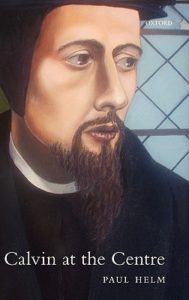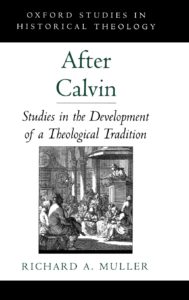 In my earlier post, Problematic Methodological Premises of “Calvin against Calvinists” Scholarship, I noted that Calvin placed providence and predestination together in book 3 of the Institutes of 1539. Calvin’s decision arose from his preaching and pedagogical interests, as evidenced by his French Catechism (1537), but he was probably influenced by Paul’s teaching of the “ordo salutis”. Richard Muller explains: “In the 1539 Institutes, Calvin shifted the credal discussion forward and placed a revised order of repentance, justification, the testaments, and predestination (now juxtaposed with providence) after his exposition of the creed—and the best explanation for this arrangement remains his accommodation to the Pauline ordo modeled on Melanchthon.” [Richard Muller, The Unaccommodated Calvin (Oxford UP, 2000), p. 136] However, in the final edition of the Institutes (1559), Calvin separated providence from predestination by moving providence to book 1 while leaving predestination as it was in book 3. Continue reading “Why Calvin Separated Providence from Predestination in the Institutes (1559)”
In my earlier post, Problematic Methodological Premises of “Calvin against Calvinists” Scholarship, I noted that Calvin placed providence and predestination together in book 3 of the Institutes of 1539. Calvin’s decision arose from his preaching and pedagogical interests, as evidenced by his French Catechism (1537), but he was probably influenced by Paul’s teaching of the “ordo salutis”. Richard Muller explains: “In the 1539 Institutes, Calvin shifted the credal discussion forward and placed a revised order of repentance, justification, the testaments, and predestination (now juxtaposed with providence) after his exposition of the creed—and the best explanation for this arrangement remains his accommodation to the Pauline ordo modeled on Melanchthon.” [Richard Muller, The Unaccommodated Calvin (Oxford UP, 2000), p. 136] However, in the final edition of the Institutes (1559), Calvin separated providence from predestination by moving providence to book 1 while leaving predestination as it was in book 3. Continue reading “Why Calvin Separated Providence from Predestination in the Institutes (1559)”
Month: November 2022
Problematic Methodological Premises of “Calvin against Calvinists” Scholarship
 One of the problems with the “Calvin against Calvinists” scholarship is that it is based on questionable theological premises. This includes the claim that there is conflict between the predominantly scriptural and Christocentric theology of Calvin and the theology of later Calvinists or Reformed Scholasticism whose application of Aristotelian philosophy and speculative formulation of the will of God resulted in a doctrine of God which is rationalistic and predestinarian.
One of the problems with the “Calvin against Calvinists” scholarship is that it is based on questionable theological premises. This includes the claim that there is conflict between the predominantly scriptural and Christocentric theology of Calvin and the theology of later Calvinists or Reformed Scholasticism whose application of Aristotelian philosophy and speculative formulation of the will of God resulted in a doctrine of God which is rationalistic and predestinarian.
However, while the orientations of the two theological approaches are different, they are not mutually exclusive. Neither are they homogeneous systems. Indeed, the intellectual currents of the Reformation era were diverse and complex. Recent scholarship exemplified by the eminent historian Heiko Oberman has brought into question the now superseded view that Reformation thought is sharply discontinuous with medieval scholasticism. A balance reading of the historical sources would give due recognition to the issues of continuity and discontinuity in development of Reformation thought. Without doubt, a new appraisal of the questionable premises of the “Calvin against Calvinists” scholarship is in order. Continue reading “Problematic Methodological Premises of “Calvin against Calvinists” Scholarship”
Election and Middle Knowledge: Arminius’ Gambit and Reformed Response

Recently, one scholar [William Craig] has proposed Molina’s concept of a divine foreknowledge of future contingents lying outside of or prior to the divine will as a possible point for dialogue between Arminians and Calvinists – as if the concept had never before been proposed by Arminianism, and as if the concept actually offered a middle ground between the Arminian and Calvinist theologies. For scientia media to become the basis for such rapprochement, however, the Reformed would need to concede virtually all of the issues in debate and adopt an Arminian perspective, because, in terms of the metaphysical foundations of the historical debate between Reformed and Arminian, the idea of a divine scientia media or middle knowledge is the heart and soul of the original Arminian position. Middle knowledge is not a middle ground. It was the Arminian, just as it was the Jesuit view, in the controversies over grace and predestination that took place in the late sixteenth and early seventeenth centuries. Continue reading “Election and Middle Knowledge: Arminius’ Gambit and Reformed Response”